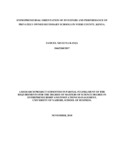| dc.description.abstract | In an environment where performance in private schools is key to competitiveness and sustainability, EO aspects of the investors are thought to play some significant role in directing and planning operations with the aim of achieving desirable results in a competitive environment. The study sought to establish the extent of EO of the investors in private secondary schools in Nyeri County and how then determine the relationship between the three dimensions of EO, that is, pro-activeness, risk-taking and innovativeness, on school performance, which was defined by national examination results, extra-curriculum activities and operation stability. The study was pegged on four theories namely: institutional theory, disruptive innovation theory, human relations theory and behaviorist theory of learning. Literature review has been documented for past studies and gaps that the study sought to address were highlighted. It focused on all the private secondary schools in Nyeri County with the whole population being used in the study. Primary data was obtained from the respondents through semi-structured questionnaires that were duly filled by either the school owners or managers, commonly known as principals. The research design used in the study is descriptive survey because of its appropriateness due to the data that was required. Data was analyzed using SPSS, summarized and paraphrased to make inferences from the data collected. Tables were used to present the results. On the extent of EO of the investors in private schools, the study concludes that all the dimensions of EO are present in different extent ranging from moderate extent to very great extent across the entrepreneurs that the study targeted. On the relationship between EO of the investors and performance in secondary private schools, the study confirmed that there is a positive relationship with innovativeness being the only significant variable among the three dimensions. The other two were not significant and had a negative relationship. The model explained 34.6% of the performance showing that there are other factors that significantly influence school performance. The study concludes that investors in privately owned secondary schools in Nyeri County have all the three dimensions of EO, that is, pro-activeness, risk-taking and innovativeness. They possess this in very different degrees where some have moderate, others great extent and some very great extent. In addition, the study concludes that innovativeness significantly influences performance of private learning institutions with risk-taking and pro-activeness not significantly nor positively influencing overall performance measures focused in this study. The study makes recommendations that owners and managers should focus more on innovativeness as it is has a positive and significant influence on performance. In addition, they should focus on exercising risk-taking and pro-activeness in a more objective manner. A recommendation for further study on the same area with a larger population, in another region and including other variables was noted. | en_US |



